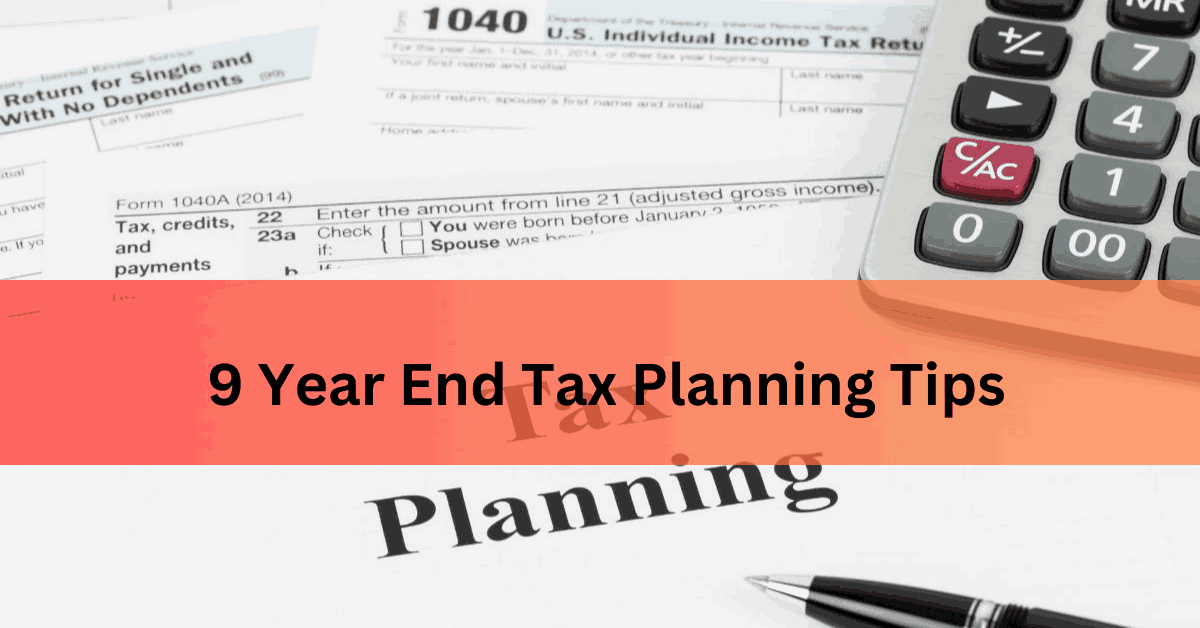9 Year End Tax Planning Tips
Year-End Tax Planning Tips: Optimizing Your Finances for a Stronger Future As the year draws to a close, it’s prime time to engage in strategic financial planning, particularly concerning taxes.
Whether you’re a business owner, a self-employed individual, or a taxpayer navigating personal finances, understanding and implementing year-end tax planning strategies can significantly impact your financial standing.
These tips can help you optimize your taxes and lay a solid foundation for the upcoming fiscal year.
1. Review and Organize Financial Records:
Begin by organizing your financial records. Gather receipts, invoices, and documents related to income and expenses. This step is crucial as it sets the stage for accurate tax preparation. Ensure you have all the necessary documentation to support your deductions and credits.
2. Maximize Retirement Contributions:
Contributing to retirement accounts like IRAs (Individual Retirement Accounts) or 401(k)s can reduce taxable income. For the tax year, you’re allowed to contribute a certain amount to these accounts, and any contributions made before the year’s end can potentially lower your taxable income.
3. Take Advantage of Deductions and Credits:
Explore available deductions and credits applicable to your situation. This could include charitable contributions, mortgage interest, education expenses, or medical costs. Ensure you maximize these benefits by taking advantage of them before the year concludes.
4. Capitalize on Losses and Gains:
Review your investment portfolio. Consider selling assets that have experienced losses to offset capital gains. This strategy, known as tax-loss harvesting, can minimize your tax liability. Conversely, if you have investments with significant gains, evaluate the option of selling and potentially utilizing tax-saving strategies like deferring gains through reinvestment.
5. Plan for Business Owners:
For business owners, consider strategies like accelerating expenses and delaying income to optimize tax liability. Evaluate purchasing necessary equipment or making business-related expenditures before the year ends to offset taxable income.
6. Understand Tax Law Changes:
Stay updated on any recent changes to tax laws or regulations. Knowledge of alterations in tax policies can help you adjust your financial strategies accordingly and take advantage of new opportunities or incentives.
7. Contribute to Health Savings Accounts (HSAs) or Flexible Spending Accounts (FSAs):
Contributions to HSAs and FSAs can be made pre-tax, reducing your taxable income. These accounts can help cover eligible healthcare expenses, and contributing before year-end can maximize your tax savings.
8. Consult with a Tax Professional:
Seek guidance from a tax pro or financial advisor. Their expertise can provide personalized advice tailored to your specific financial situation. They can offer insights into complex tax scenarios and help you navigate the most advantageous strategies for your circumstances.
9. Plan for the Next Year:
Use the year-end tax planning as an opportunity to set financial goals for the upcoming year. Assess what worked well and what needs improvement. Establish a plan to track expenses, investments, and savings to better manage your finances in the future.
Year-end tax planning is a proactive approach to managing your finances effectively. By implementing these tips, individuals and businesses can take control of their tax liabilities and position themselves for a stronger financial future.
Remember, the key is to act strategically and consult with professionals to ensure you’re making the most beneficial decisions for your financial well-being. As the year winds down, seize the opportunity to optimize your taxes and lay the groundwork for a successful financial year ahead.




